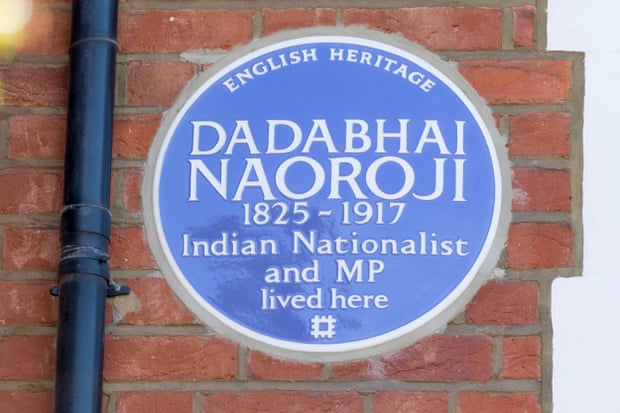[ad_1]
Dadabhai Naoroji, who in 1892 became the first Indian to win a popular election to the UK parliament, has been commemorated with a blue plaque.
Known as the “grand old man of India”, Naoroji’s long career in politics was defined by his campaigning against British rule in India. He is celebrated with a blue plaque to mark the 75th anniversary of Indian independence.
Naoroji, who is often described as the father of Indian nationalism, spent more than three decades of his life in London. His plaque marks the redbrick semi-detached house in Penge, Bromley, that was his home around the beginning of the 20th century.
Naoroji first stood for parliament as a Liberal candidate for Holborn in 1886. He was unsuccessful, despite the endorsement of Florence Nightingale. But it was a comment by prime minister Lord Salisbury – that the time had not come when “a British constituency would elect a black man” – that propelled him into the national spotlight. In the general election of July 1892, Naoroji was elected as a Liberal MP for the north London constituency of Finsbury Central, in the face of hostile propaganda that claimed he was a fire-worshipper.

On 26 July 1892, the Guardian described his election as “the first of its kind”, and was largely supportive of the news. “It is an honour to England, and we acquiesce when we are told that it is an honour to India,” the article notes.
The story goes on to use Naoroji’s electoral success to justify British rule in India, and insist that “British parliament is always just and humane to the full measure of the light it possesses”.
Mihir Bose, an author and English Heritage blue plaques panel member, said Naoroji’s election 130 years ago caused a huge stir within the country. “What was interesting was the Marquess of Salisbury [Robert Gascoyne-Cecil], who served as prime minister three times, said ‘the British will not vote for a black man’, but they did,” said Bose. “He stood on the Liberal party ticket and he got elected. When he took his oath in the Houses of Parliament, he didn’t take it on the Bible, he took it on his Zoroastrian holy book.”
In his early political career, Naoroji didn’t advocate for full independence of India. He wasn’t alone – most Indians argued for reform of the British governance of India. The fight for independence came later, Bose explained. “In India, he became one of the founding fathers of the Indian National Congress, the party that took India to independence.”
Sign up to First Edition, our free daily newsletter – every weekday morning at 7am BST
During his term as an MP, Naoroji advocated for the right of women to sit in parliament and for Irish home rule.
Naoroji is most well known for being one of the first people to try to estimate the economic cost of colonialism on the colonised, Bose said. This set out to show the severe economic harm caused to Indians by the British empire, and how any benefits from the British presence there were incidental. His key book underpinning this theory, Poverty and Un-British Rule in India (1901), was published while he was living in Penge.
Naoroji joins many others who received blue plaques after their work helped to set India on the path to independence, including Mahatma Gandhi, Jawaharlal Nehru, VK Krishna Menon and Sister Nivedita, who is known to have visited him at his home in Penge.
Naoroji’s blue plaque is one of many steps that English Heritage hopes to take to celebrate more individuals of ethnic minority backgrounds, Bose said. A Guardian analysis last year found that 96% of blue plaques were awarded to white individuals.
“We recognise that they’re not enough and we would like to do more,” he added.
[ad_2]
Source link